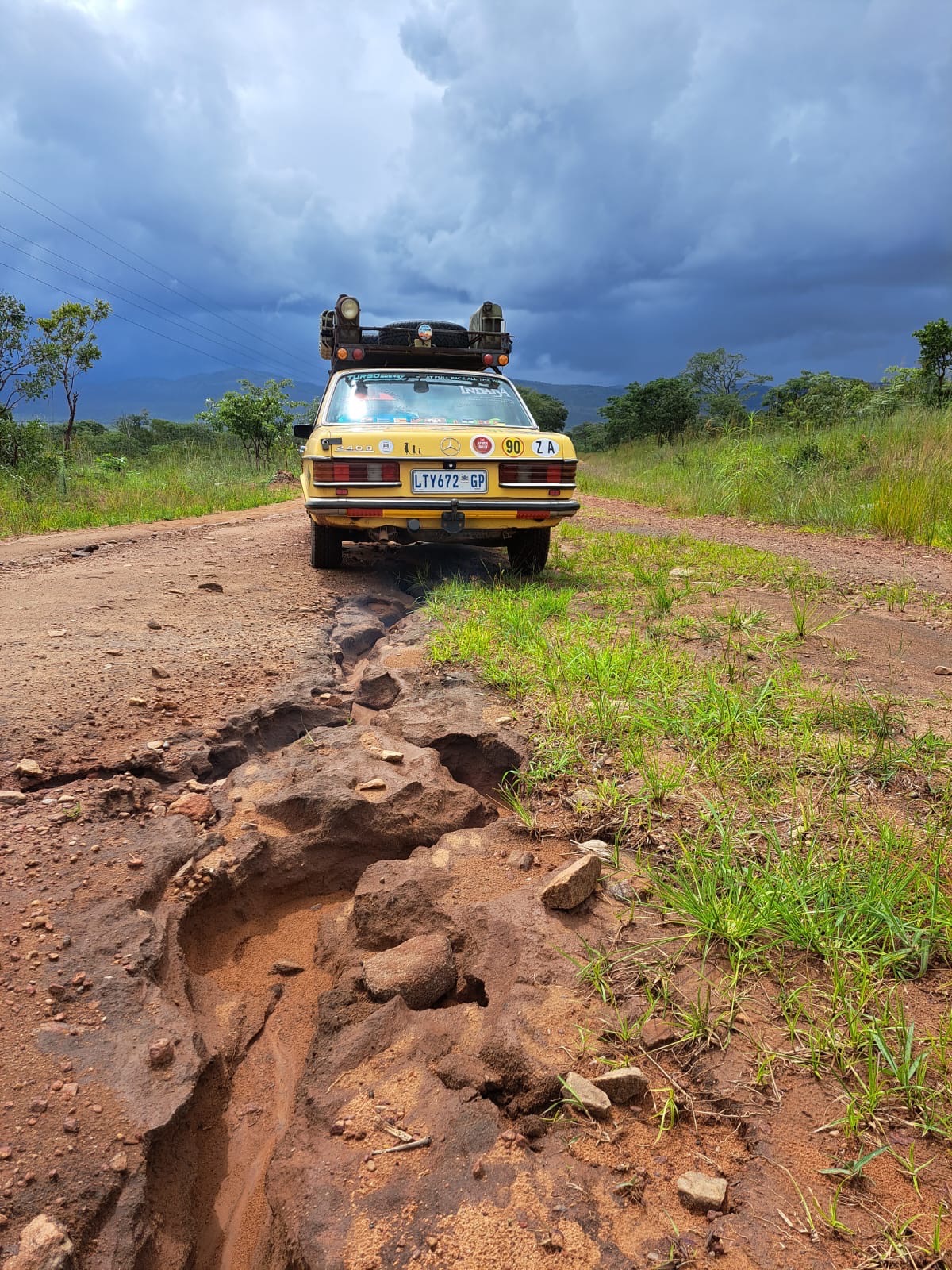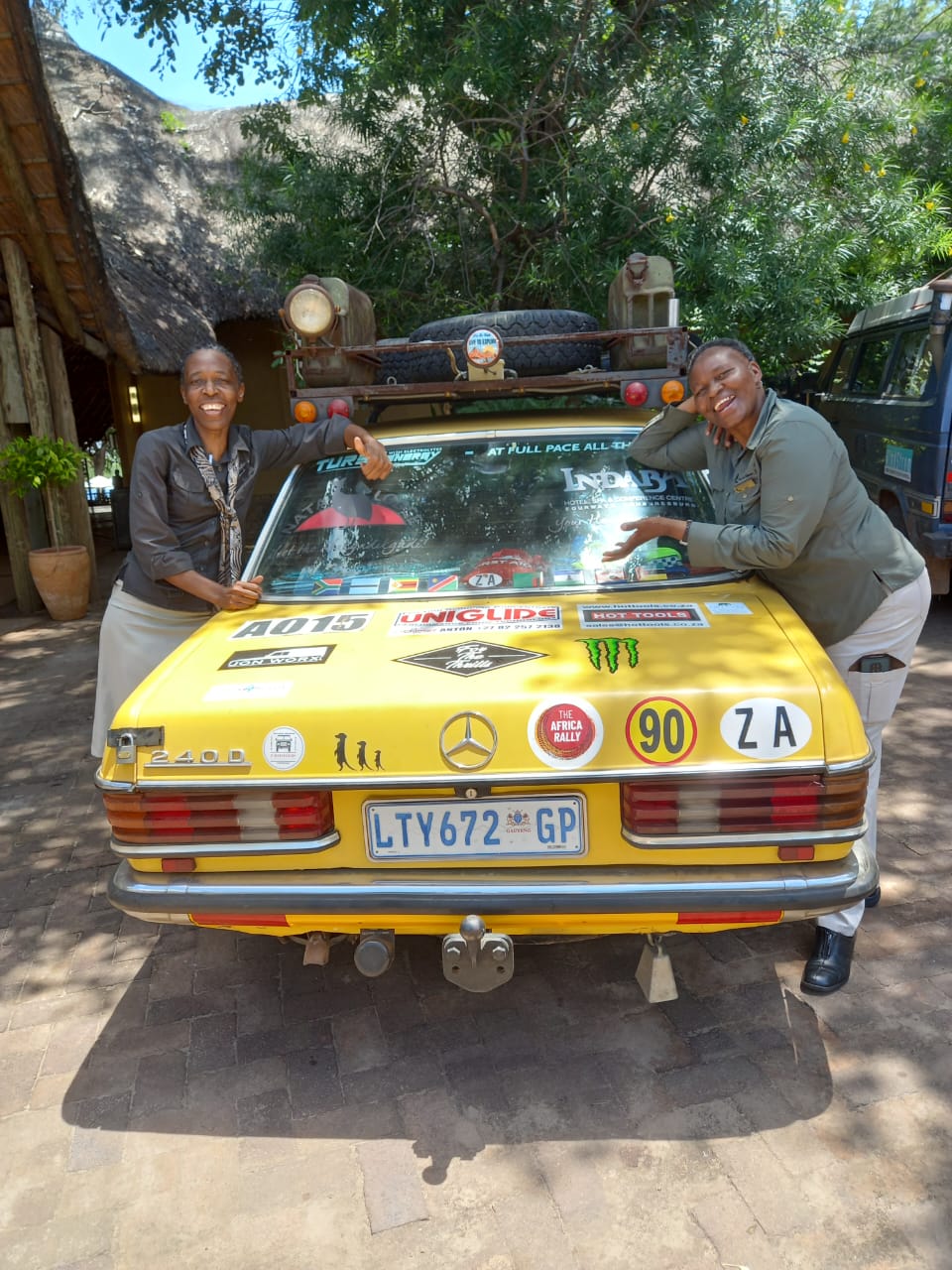Tanya Ritchie-Hicks and her son were casually perusing the internet when they spotted a lemon-hued 1981 W123 Mercedes-Benz car for sale. Tanya hated yellow cars, and this one was particularly hideous. But it had a diesel engine, and it was cheap, so they went for it.
Later, as Tanya’s son drove the Mercedes through the gates of her home in northwest Johannesburg, South Africa, she felt an overwhelming intuition. Walking into the house, she grabbed an old Michelin map from 1994. The paper held a route plan from Johannesburg to Mombasa that she had marked decades earlier. That confirms it. That’s the route I’m taking, she decided.
“I knew without any doubt, no doubt at all, that I was going to do this trip,” Tanya tells me on a spotty WhatsApp call. “We were going to call the car ‘Mustafa.’ Don’t ask me where that came from. I don’t know.” She laughs. “It was all really bizarre.”
Tanya and her co-driver Helen Haun drove Mustafa from South Africa through Botswana, avoiding sofa-sized potholes in Zambia and navigating wet and unpredictable roads in Tanzania. Cyclone Freddy, the longest-lived tropical cyclone to date, brought devastating floods to Malawi this spring, killing over 1,000 people and terminating Tanya and Helen’s trip to northern Tanzania.
I recently caught up with Tanya to learn more about her travels through parts of Southern Africa with Helen, a newfound friend, in a rally-kitted 1981 Mercedes-Benz. What I didn’t expect, however, were the tales from Tanya’s past—of Land Rover expeditions, endangered black rhinos, and crossing the Sahara in the mid-’90s.

You and Helen didn’t know each other prior to the trip. How did you meet?
I advertised in a Facebook post. I said, if you don’t love Africa, there’s no point coming. This is a road trip, not a holiday. Seventy-eight people replied. Some were enthusiastic when they read it, but by morning they sobered up and didn’t want to come. I said to [the rest], okay, send me a two-minute video because that was the best way to see what they were like. So, this lady [Helen] was British and lived in Oman for 20 years. She was quite a bit younger than me, but my son and I thought she had good energy and [she] wanted to do her own trip through Africa afterward.
How did it go?
We met a week before we started the trip. I knew it could be a problem, but we got along really well. We had a good laugh. I can’t remember what we laughed about, but we laughed all day. By 9 o’clock, there’s no electricity here, so we’re always reading books. Out there, we were up until midnight laughing and joking.
She bought one of these cute Bluetooth speakers, and we sang along to some dreadful music. We were driving through Zambia with potholes as big as a sofa and trucks ahead and behind us, and we couldn’t overtake them because we didn’t have the power, but we managed to laugh all day.
How did you outfit the Mercedes for the trip?
To be perfectly honest, the Mercedes had done a rally. It was [previously] owned by an old lady, and two guys bought it for a South African rally called the Bull Run. They’d already raised the suspension, put a roof rack on, and an aftermarket fuse box for the spotlights. We had to take the mountaineering rope off the top that they put on just for [expletive] and giggles. Basically, we did a lot of maintenance. We replaced tie-rod ends and a whole lot of other stuff. But can you believe it? The day we were supposed to leave, one of the CV joints went.



How did Mustafa, your Mercedes, fare on the road?
There was nothing that Mercedes wouldn’t go through. That was incredible. We just crashed through every bit of road, every bit of track. We were towed once, backward up a hill, only about 20 yards or something. Road conditions were awful. Once we got north of Lusaka [Zambia], the potholes were so big—it was absolutely crazy. The road got narrower and narrower, so dust was on each side. Where it should have been two lanes, it was basically one. Others told me that trucks in Zambia would come straight at you, and they were telling the truth. If [the truck drivers] decided they were going to overtake, you had to get out of the way because two trucks were coming towards you in parallel.
But, oh gosh, the reaction to the car was phenomenal. Even before we left, everybody tooted and waved. People on safaris and in Maseratis and Porsches would pull up. In Zambia and Botswana, you get these little taxi drivers on motorbikes waiting for their fare, and all the tuk-tuks would be parked with them. They would all jump up and down, cheering, and we would wave madly out the window. It was great fun.
What were some highlights of this trip?
We stayed at Chobe Safari Lodge [in Botswana] and took a cruise on the Chobe River. There are so many elephants in Botswana. We saw loads, and it was fantastic. Then we stayed in a house with an upstairs balcony near the top of Tanzania, by the Usa River. In the morning, you could see Kilimanjaro and Mount Meru, which was beautiful.


What was it like being amongst the wildlife in Botswana?
The wildlife is why I came to Africa. It’s just you and the energy of that animal—that energy is always pure. Not spiritual, but pure, not corrupted by anything. I could sit all day and watch the animals. The elephants are just roaming around on the road, not caged like in a massive zoo where people drive through and look at them.
Did you always have an interest in vehicles?
A little bit, but not to this extent. I’ve become very possessive about the car, even though it’s not mine. I’ve started to buy it from my son. I’d always had Land Rovers because I drove across the Sahara in 1995. Ironically, now my son rebuilds them.


Tell us more about your Sahara experience.
I came to Zimbabwe from a little tiny village in England to dehorn [endangered] black rhinos with the University of London. It didn’t work, because the poachers would still trap the rhinos and cut off the rest of the nose to prove they got the rhino. A lot of the black ones now are in Intensive Protection Zones (IPZ) where they have an armed guard with them day and night. They don’t tell anybody where they are.
Anyway, I decided to stay [in Africa] and learned a lot, like how to change tires in under two minutes when lions are watching. When I went back to England I thought, I can do it. I can drive to Africa. I went to the World Geographic Expedition Society and said, “I’m looking for people to come with me across the Sahara.” Nine people wanted to come, so I bought another Land Rover from the military in England and equipped it for the trip to The Gambia.
You had to go with a convoy and the military in those days because Western Sahara was mined. The vehicles kept breaking down. We camped in the middle of massive sand dunes and would lie in our tents and recite recipes because everybody dreamt about fresh food every night. That was quite incredible.
What did you learn from this most recent trip?
I learned that I can be independent. That, to me, was a big part of regaining my self-confidence and self-esteem. I could tackle anything that needed to be done on the Mercedes and knew a lot more about mechanics than I thought. I understood the vehicle a lot better than I had ever considered, and since I’ve come back, I’ve carried on with the maintenance of it.
One of the other things I learned was if you don’t eat anything out of a tin or a jar—if every single bit of food is fresh—your hair grows about three inches and so do your nails. So that was quite telling.
We met a Sikh guy from India who’d been traveling Africa for nearly two years. What I learned from him was to take your time. Don’t just go from place to place in a hurry because you’ve got deadlines. Stop and smell the roses. [The trip] was far too rushed. That’s the only thing I regret.
Learn more about Tanya and Helen’s adventures on Instagram and Facebook.
Our No Compromise Clause: We carefully screen all contributors to ensure they are independent and impartial. We never have and never will accept advertorial, and we do not allow advertising to influence our product or destination reviews.
Read more: Going Home to Africa : Interview With Author and Solo Traveler Dot Bekker


